If you find yourself working longer hours or maybe feeling a bit more stressed at the end of the day, you’re not alone. Fifty percent of college faculty who completed the annual Faculty Focus reader survey said that their job is more difficult than it was five years ago. Only nine percent said their job is less difficult, while 33 percent said it’s about the same.
For those who find their job more challenging, the reasons are wide-ranging. Some mentioned larger classes or a heavier course load, while for others it’s keeping up with technology or a move to the online classroom that’s adding extra hours to their work day. Additional committee work and administrative responsibilities also were mentioned frequently, as were budget cuts that have reduced the availability of resources and support. Finally, many readers commented that today’s students often bring new challenges because they seem less prepared and less motivated for the rigors of college, are more likely to argue about assignments and grades, or, in some cases, are stretched thin themselves due to work or family responsibilities.
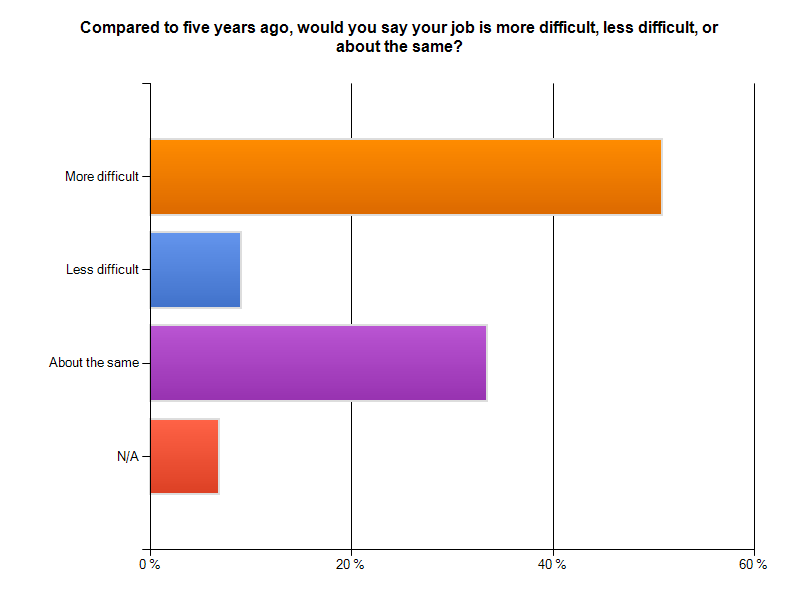
|
Survey demographics
The annual Faculty Focus reader survey was conducted in April 2013 with 1,247 higher education professionals completing the online survey out of the 85,789 subscribers who received the invitation to participate. Approximately 65 percent identified themselves as professor/instructor, with the largest percentage (32.4 percent) working at four-year public institutions, followed by four-year private institutions (25.6 percent), and two-year public institutions (22.7 percent). In terms of how long they have worked in higher education, it ranged from fewer than five years (18.5 percent), six to 10 years (24 percent), 11-15 years (17.6 percent), 16-20 years (11.8 percent) and more than 20 years (28 percent).
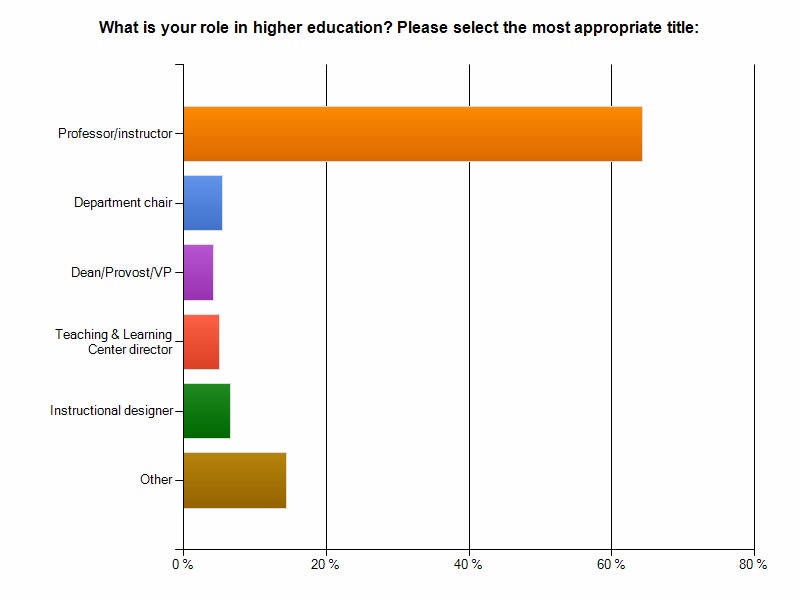
|
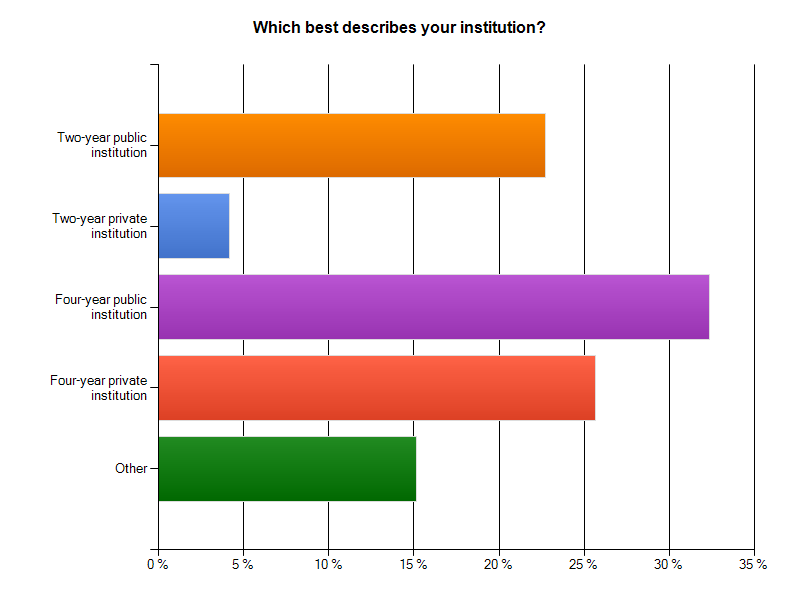
|
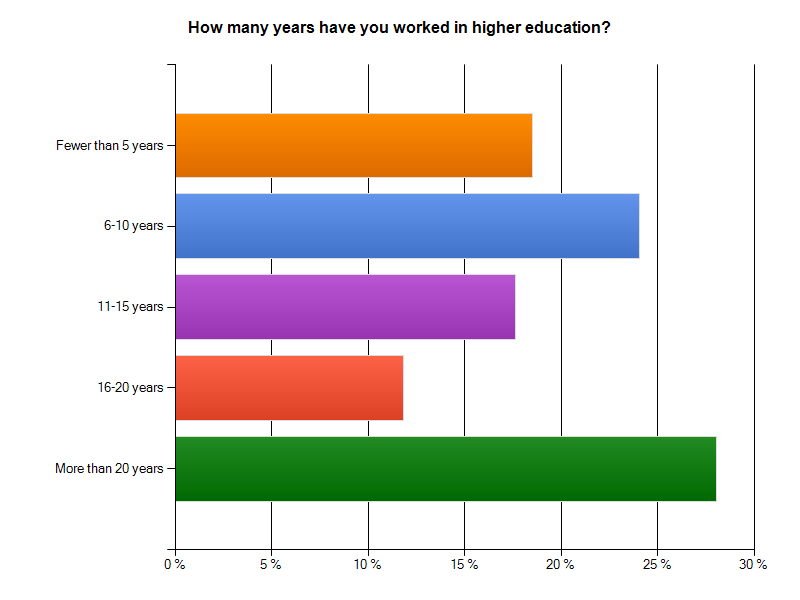
|
Academic activities, challenges, and interests
The growth of online and blended courses was evident among readers with nearly 64 percent saying they teach, manage, or support online or blended courses. That’s up just slightly from 62 percent in 2012 but is significantly more than the 55 percent in 2011.
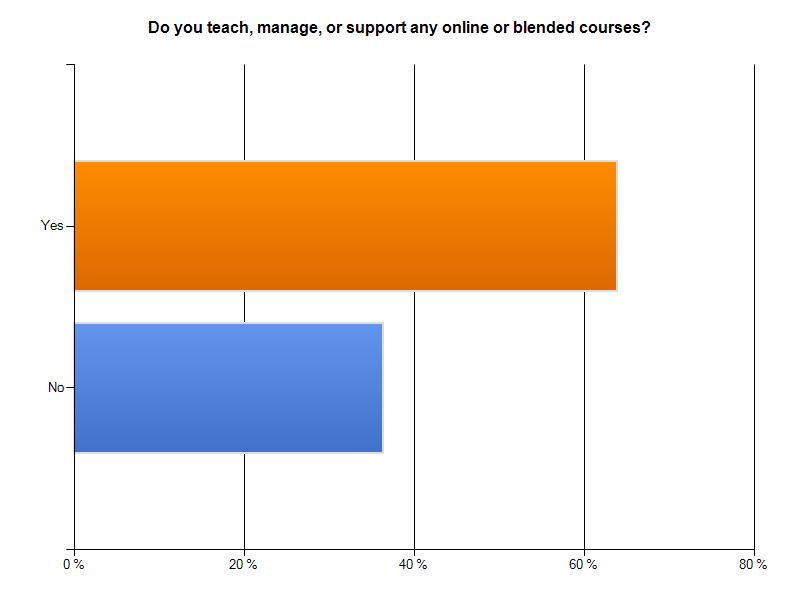
|
In a new question for 2013, we asked about specific types of courses or activities readers engaged in during the past year. Responses ranged from a high of 85.2 percent having attended a professional development workshop or conference to 18.7 percent having taught a flipped course. Considering the relative newness of the concept of the flipped classroom, the fact that nearly 20 percent of faculty have taught such class is rather impressive.
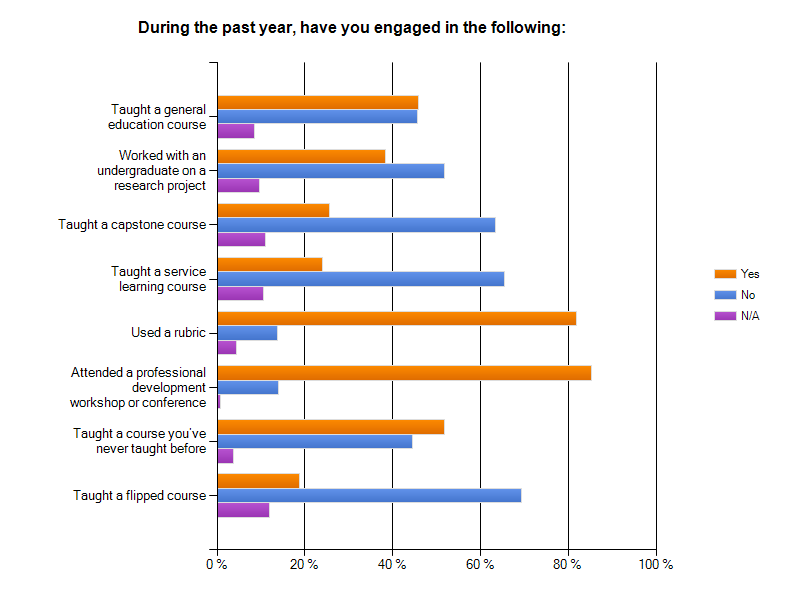
|
For the second year in a row, unmotivated and unprepared students were identified as the biggest day-to-day challenges for Faculty Focus readers. Meanwhile, on the opposite end of the spectrum, only a small percentage of readers said student incivility and lack of collegiality in the workplace are problematic. A variety of other issues, including technology distractions, plagiarism, and demands outside of teaching, are somewhat to moderately problematic for most readers.
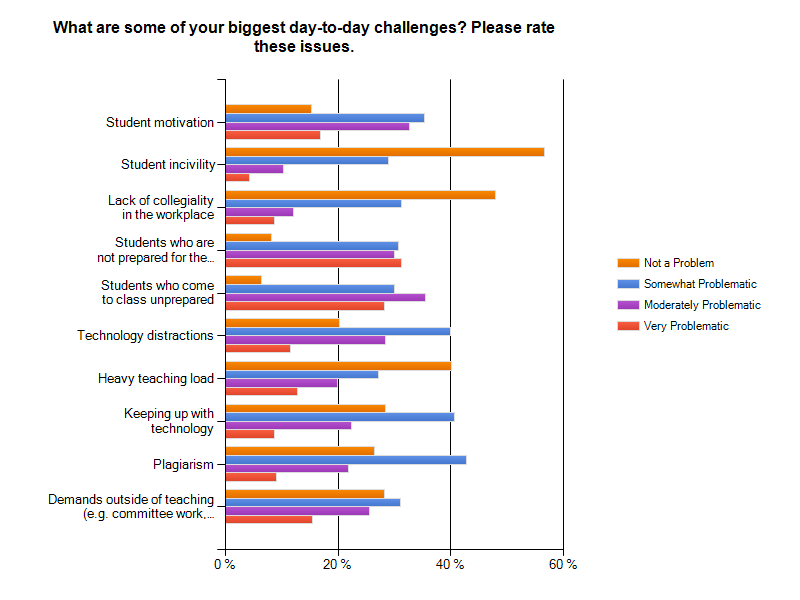
|
As a follow-up to this question, readers were given the option to share some of the other challenges they face on a regular basis. Here are just some of the comments we received:
- Difficulty in getting blocks of time in which to focus on learning new technologies balancing work/home life
- Lack of funds
- The worst aspect of teaching now, after nearly 40 years in the profession, are the students who are not prepared for the rigors of college
- Being asked to teach a course with little or no advanced notice (as a part-time faculty associate), demands outside of the workplace (e.g., family/kids schedules, time for exercise)
- Mindless, extensive paperwork
- Grading load, particularly from larger writing-enhanced courses
- Dealing with entitled students
- Lack of time. I teach and am an administrator, but thoroughly enjoy both
- Having the University recognize the importance of teaching in a research intensive highly competitive environment
- Finding ways to integrate the assigned reading into class sessions so that students don’t feel as if it’s just extra work that they do; effectively leading classroom discussions; finding new teaching strategies and methods that I can apply to my subject matter
- Heavy grading load, in part because every assignment needs to have a consequence if not done or students will not do it
- Finding time to integrate new technology or updating to newer technology in my course work
- How do we convince students that there is value in long-term, careful, thoughtful study? This also speaks directly to the question of their motivation for working toward a degree. The credential has become far more important than the learning for many, if not most, of my students!
- Finding time to be creative in developing my courses
- Grade inflation. Students expect to get a “good grade” simply because they attended class vs. putting in the effort to earn the grade.
- Engaging 1st year students in discussions
- Biggest problem is that students lack basic knowledge and skills. They are prepared to work hard, but are ill-equipped
- Finding culturally relevant reading resources
- Students’ poor writing skills
- Finding time to develop creative and engaging lessons. Also, finding new examples and case studies to integrate into my lessons.
- Writing new assessment tools especially quiz and exam questions.
When asked about the article topics that interest them, Faculty Focus readers expressed being “very interested” in nearly all of the 15 topics suggested. The three top-rated topics were teaching with technology (56.3 percent very interested) learner-centered teaching (56.2 percent very interested), and facilitating discussion (50.2 percent very interested). In 2012, the top three were learner-centered teaching, teaching with technology, and assessment and grading. Facilitating discussion was not offered as a choice last year, although it is a topic we have always covered quite a bit in Faculty Focus and we certainly will continue to do so.
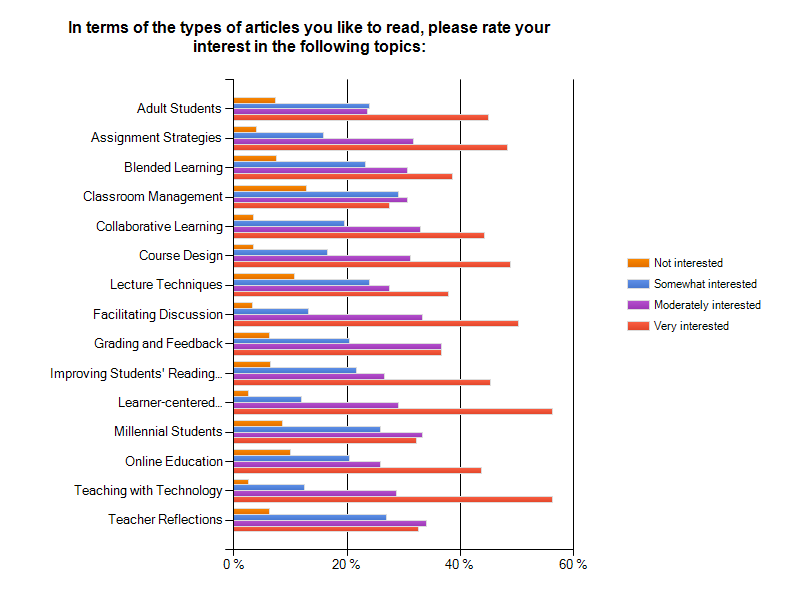
|
Answers to your questions
Our 2013 survey marks the fourth year we’ve conducted a reader survey and each survey brings new insight into our readers’ challenges, needs, and interests. We would like to thank everyone who took the time to share their thoughts. The feedback has helped to confirm suspicions, challenge assumptions, and offer valuable perspective to the work we do.
In this article, we tried to summarize the highlights of the survey, but we also received quite a few “housekeeping” comments and questions around the same theme that we wanted to respond to as well.
Frequency: Faculty Focus publishes an article every day, Monday – Friday, but only sends out its enewsletter on Monday, Wednesday, and Friday. The Friday issue includes the Week in Review, which allows you to see all five articles from the week. During the holidays and a few weeks in the summer, we often go to an abbreviated publishing schedule.
Readers who don’t wish to receive the enewsletter three times per week, can opt to change their frequency to a Friday-only subscription. To do this, simply follow the “email frequency” link at the bottom of the enewsletter.
Article submissions: Faculty Focus welcomes article submissions from its readers. As a reader, you know the types of article that your colleagues find of value. We’re always looking for articles on effective techniques, new ideas, strategies that work, and pragmatic things teachers can do in the classroom. So if you’ve developed an innovative way of improving student learning, integrating technology, or facilitating classroom discussion, for example, we’d love to share it with others. Our submission guidelines can be found here: https://www.facultyfocus.com/about/contribute/.
Again, thanks for your feedback in helping us to continue to improve Faculty Focus!





